Ukrainian Alpha: terrorism will not pass
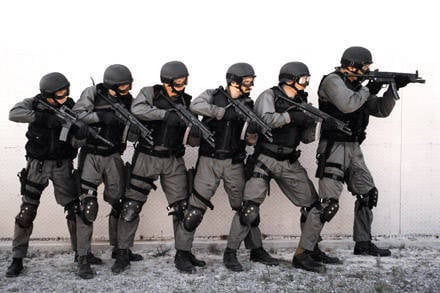
Historical information
March 3, 1990 is considered the date of creation in Ukraine of a special unit for combating terrorism. It was then that by order of the head of the 7th department of the KGB of the USSR, the 10th group (Kyiv) of Group "A" of the ODP Service of the 7th department of the KGB of the USSR was created. The order noted that "a special operational-combat unit is designed to localize and suppress terrorist and extremist actions, other especially dangerous criminal manifestations, including for conducting operations in cooperation with other interested units in the fight against organized crime." Higher requirements were imposed on candidates for regional special forces: high moral and strong-willed qualities, good professional and physical training, medical suitability for service in the Airborne Forces, at least 1 year of work experience in state security agencies, an age limit of up to 33 years and many others. Of the 120 employees of the KGB of the Ukrainian SSR, sent for consideration as candidates for the 10th group (Kyiv) of Group "A", only 15 employees were selected. The first commander was Pyotr Feliksovich Zakrevsky, now a reserve colonel.
On May 30, 1992, by order of the Chairman of the SBU, in the structure of the central office of the SBU, the 10th group (Kyiv) of Group "A" was transformed into service "C" (special service), the head of which, in accordance with the developed and approved Regulations, reported directly to the chairman of the SBU, and in his absence, to the first deputy chairman. Employees of the "C" service conducted many military operations and completed many special tasks in the interests of Ukraine.
One of these tasks was the protection and escort delivered to Ukraine during 1992-1993. by sea and air transport of containers with the new currency of Ukraine, printed in France, Italy and Canada. In August 1992, under conditions of heightened secrecy, almost the entire circulation of the hryvnia was to be transported from Canada at once. The plan provided for absolute secrecy in the preparation and implementation of the operation. For transportation, a civilian ship was chosen with an ordinary crew who did not know what kind of cargo would be on board. They deliberately refused to escort the ship by naval forces. Only the captain was privy to the details of the operation, and the top leadership of the state and the chairman of the SBU also knew about it. The campaign lasted 49 days. The ship passed more than 11 thousand miles across the Atlantic Ocean, 8 seas and 13 straits, crossed the borders of 10 states, called at 8 ports. At the same time, there were also emergency situations when the fighters of the special group were preparing to repel a possible attack on the ship, but everything worked out. Watches were the usual daily work (some of the fighters performed the functions of sailors during the campaign), there were two training sessions in hand-to-hand combat, classes in the tactics of protecting the crew and cargo, and drills.
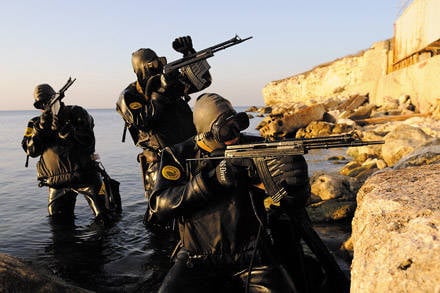
There were four such trips in total. In 1994, service "C" employees made a significant contribution to stabilizing the situation in the Crimean region. By that time, for socio-economic reasons, the criminal situation in Ukraine had become more complicated, tension in society was growing. In some regions, criminal gangs operated almost openly. Armed conflicts often arose between them with grave consequences. The number of robbery attacks on citizens, officials, and merchants increased. There was a redistribution of property. Physical violence and killings have become commonplace. The lives of victims, witnesses and other participants in criminal proceedings were often at risk. Ukraine became attractive for international crime - in terms of organizing drug trafficking, smuggling weapons and other illegal actions. All of this highlighted the problem of countering crime.
Therefore, on June 23, 1994, by decree of the President of Ukraine, Department “A” of the Security Council of Ukraine (Department for Combating Terrorism and Protection of Participants in Criminal Proceedings) was created on the basis of Service “C” of the SBU. Two new functions were assigned to department "A" on the basis of the laws of Ukraine "On ensuring the safety of participants in criminal proceedings" and "On state protection of judges and law enforcement officials." Vasily Vasilyevich Krutov, now a lieutenant general, became its leader. This is how the central unit “A” arose, and then its linear departments of the Security Council of Ukraine in all regional cities of the republic and in the city of Sevastopol. They were tasked with the physical suppression of terrorist acts and actions that threaten the security of the state, the release of hostages, the capture of dangerous criminal authorities, the protection of participants in criminal proceedings, employees of courts and law enforcement agencies, and their families. If necessary, ensuring the security of senior officials of the state, as well as the implementation of particularly complex and responsible instructions of the country's leadership.
The equipment and equipment of the first Ukrainian "Alfa" were quite scarce. Modern at that time protective helmets of the Swiss company TIG, as well as experimental Russian developments in this area, were only in Kyiv, and then in small quantities. The main shoes were adidas sneakers (Moscow). Bulletproof vests were purchased from Armokom (Russia). After several trips to the United States for training courses for special forces, on the basis of the brought samples of equipment and uniforms, several different types of assault overalls were made to order in Ukraine, and the production of tactical unloading vests was also launched.
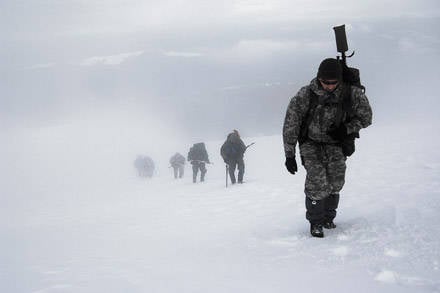
Selection system
The selection criteria for candidates to serve in Alpha are still tough. Candidates with experience of service in the army special forces, special forces of the Ministry of Internal Affairs and other security services are welcome. An important advantage is higher education. Psychological stability, readiness to work in extreme conditions are especially taken into account. After all kinds of special checks, tests and interviews, the candidate passes physical training tests, among which a special place is given to hand-to-hand combat. The candidate must confidently master the techniques of hand-to-hand combat: blocking the opponent's blows, protection from a knife, stick, threats with firearms, release from captures. Each technique must be performed skillfully, with an element of surprise, and end with a designated blow to the opponent's pain point, throw, choke or painful hold. In addition, sparring is held with three alternating “A” fighters. It is generally accepted that an employee can become a full-fledged fighter of Alpha after at least three years of service. In the process of training, he must master many knowledge and skills, including parachute training, mountaineering, diving training, mine blasting, and, of course, become a first-class shooter.
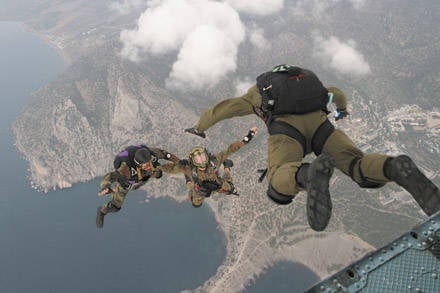
Contemporaneity
September 24 2007 by decree of the President of Ukraine No. 913 / 2007, Office A was reorganized into the Center for Special Operations for Combating Terrorism, Protecting Participants in Criminal Proceedings and Law Enforcement Officials of the Department of the Security Service of Ukraine.
At the moment, the CSO "A" of the SBU includes five departments and regional departments, based in each regional center of Ukraine. In addition to constant combat duty in their country, since February 21, 2004, SBU fighters "A" have been ensuring the safety of employees of the Ukrainian embassy in Iraq. Group rotations take place every six months. In total, more than a hundred employees underwent combat testing in Iraq. Before leaving, the group undergoes special training at the international training center near Koncha-Zaspa. There, situations of various categories of complexity are practiced, practical skills are polished to counter terrorist attacks.
All classes are held in conditions as close to real as possible, using ammunition. Shooting in the direction of checkpoints, explosions along the route of convoys, hostage-taking, escape routes, evacuation of protected persons - everything is as in Iraqi reality. The training center is a whole complex of facilities with a training ground, shooting ranges in which various situations are simulated, a killer house, a helipad and many other things necessary for the full-fledged training of a commando.
In addition to employees "A", the Center trains instructors from other special forces of Ukraine, as well as special forces soldiers of the countries - members of GUAM, NATO and Eastern Europe. It is well known that only cooperation and exchange of experience with related units help to achieve the desired results in combat work, and also contribute to the growth of professionalism and the acquisition of invaluable experience. In this regard, employees "A" travel to various countries of the world to take courses on anti-terror. Meetings at international exercises and numerous competitions with colleagues from the former Soviet republics and foreign specialists are no less productive. At international sniper tournaments (Czech Republic, Hungary) with enviable constancy, employees of the Ukrainian Alpha have been winning prizes for many years in a row. Prestigious for employees of anti-terrorist units are also international tournaments for prizes of the CIS, where not the first year (St. Petersburg, 2007; Yerevan, 2008) the guys from the Ukrainian "Alpha" become the first among snipers.
We should pay tribute to the long-awaited changes in the provision of combat groups with modern weapons, high-quality foreign equipment and uniforms. In addition to weapons produced during the Soviet era, pistols are in service: HK USP, 9 mm x 19, Walther P99, 9 mm para (Germany), Fort-14 TP, Fort-17 (Ukraine), as well as various modifications of foreign pistols - machine guns and assault rifles. To the already traditional weapons of snipers - rifles Blaser R 93 LRS 2,308 Win and SIG-Sauer SSG 3000, 308 Win (Germany) were added: Blaser LRS 2 / Tactical, 338 Lapua Mag (Germany), AW and AE, 308 Win (UK), Saco TRG, 308 Win (Finland).
A partial renewal of equipment and equipment has affected groups specializing in diving and parachute training, specialists in urban and industrial mountaineering. After general testing of various samples of camouflage uniforms, it was decided to purchase the uniform of the American company Propper in multicam colors. Preferences in choosing shoes fell on the firms 5.11 and Haix. There is also a practice of purchasing the necessary equipment and individual samples of uniforms in private, and here preference is often given to Russian firms, where price, quality and simplicity are combined into one. Bullet-proof vests of the Corsair family and light Kevlar helmets ZSHM-2, available on the equipment of fighters "A", are made in Ukraine. Heavy titanium helmets Us 95 are purchased in Austria.
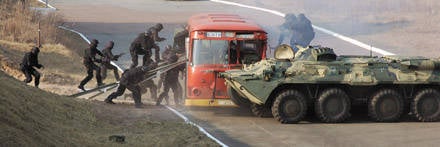
On the account of the Central Security Service "A" of the SBU, a large number of operational and combat activities were carried out, the seizure of hundreds of firearms, grenades and explosives, significant amounts in national and foreign currencies. In many regional cities of Ukraine, the forces of the unit eliminated numerous bandit groups. Little is known to the general public about the practical affairs of the Ukrainian Alpha. Even if the press reports about the detention of members of organized criminal groups by the SBU, it is not always said that this is the work of Alfa. From this, the authority of the special forces does not suffer at all.
Today, worked out to the smallest detail actions allow you to successfully carry out the most complex special events. This is achieved by everyday training. SBU special forces have a high degree of mobility. In a matter of hours, the group on its vehicles can reach anywhere in Ukraine. If necessary, allocated to the unit aviation.
Courageous, physically and psychologically trained employees come to this difficult and dangerous service. Many of them have experience of participating in hostilities in Afghanistan, other hot spots of the planet and the former USSR. The ability to assess the situation at lightning speed and make the only right decision is attached to excellent physical training, because in real circumstances, you have to risk not only your own life, but the lives of your colleagues, hostages, other people who are in places of emergency events. The high morale, cohesion, coherence and personal courage of the special forces officers make it possible to say with confidence that in Ukraine there is someone to resist terrorism. The division's motto was and remains: "Life is for the Motherland, honor is for no one!"
Information